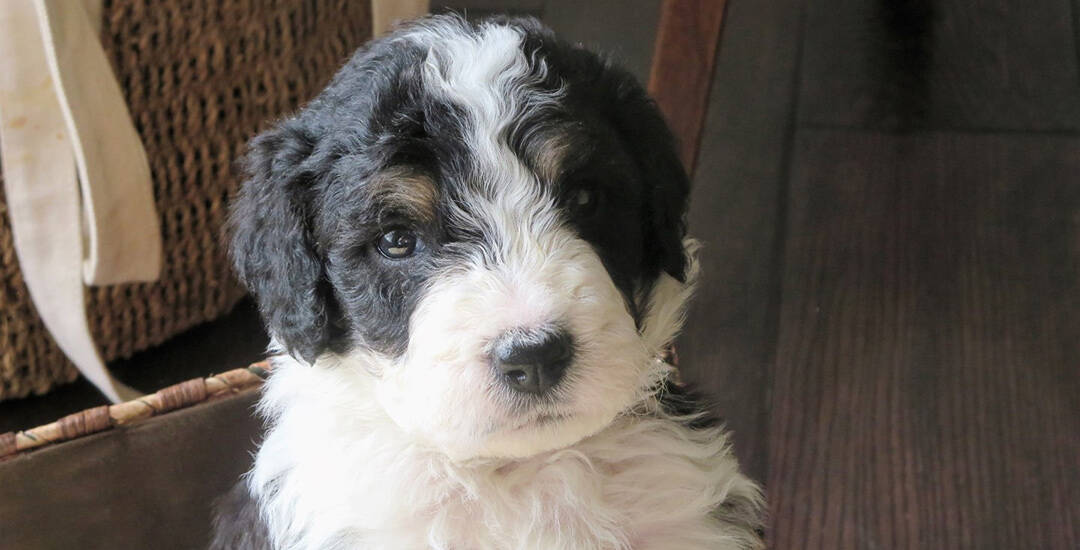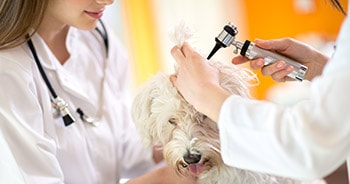Do Bernadoodles have health issues? Yes, they are still susceptible to some health issues and diseases, including hip and elbow dysplasia, eye and heart disease, and Von Willebrand Disease. Reputable breeders will screen their breeding stock for these common conditions and diseases to increase the likelihood of healthy offspring.
What is a Bernedoodle?
Bernedoodles are a cross between the Bernese Mountain Dog and the Poodle. As a crossbreed, they have what is called ‘hybrid vigor’. Also known as heterosis, hybrid vigor is used to describe the crossbreeding of two breeds with dispositions to different sets of health problems. Breeders are looking to eliminate bad traits like disease and increase the gene pool with more “positive” traits. Even with such purposeful breeding, there are still diseases and health issues these hybrids can be predisposed to, and the Bernedoodle is no different.
A veterinarian will be helpful in diagnosing not just your pet’s current health issues but also in helping to predict what diseases might emerge.
Like just about every other dog breed in the world, Bernedoodles have some health issues. One advantage of the Bernedoodle being a mixture of two breeds is that some health issues that Poodles may be prone to developing won’t necessarily happen because the Bernedoodle is only 50 percent Poodle.
The same goes for diseases that the Bernese Mountain Dog is prone to developing. In fact, breeders of these dogs state that eliminating many of these health issues common with purebreds is what led to them initially crossing the breeds. Therefore, Bernedoodles are considerably healthier dogs than purebred Poodles and purebred Bernese Mountain dogs at least in terms of hereditary diseases. However, they are still prone to certain health issues related to both the Poodle and the Bernese Mountain Dog. Their general good health also equates into a longer expected life span.
Getting a Bernedoodle? If you’re in the process of researching Bernedoodles, I highly recommend the book “Bernedoodles: A Head To Tail Guide”. Finding the right Bernedoodle puppy can be confusing and costly. In it, Sherry Rupke, the woman credited with creating the Bernedoodle, shares tons of info from selecting the perfect dog to choosing a quality breeder and more.
What Health Issues Come From Bernese Side
As stated above, despite the Bernedoodle being a relatively healthy breed, they may still develop certain health issues from one side of the family or the other. For instance, Bernese Mountain Dogs have a high rate of death from fatal cancer – much higher than most other breeds. Poodles, on the other hand, aren’t prone to developing cancer, so Bernedoodles are much less to develop cancer. Some of the health issues that may come from the Bernese Mountain Dog side include:
- Hip and elbow dysplasia
- Epilepsy
- Heart Disease
- Cancer
- Patella
- Degenerative Myelopathy
- Progressive Retinal Atrophy
- Macrothrombocytopenia
- Sebaceous Adenitis
- Von Willebrand’s Disease
What Health Issues Come From Poodle Side
When comparing the Poodle with the Bernese Mountain dog, it would appear that the Poodle is the healthier of the two since the life span of Poodles is 12 to 15 years whereas the life span of Bernese Mountain Dog is 6 to 8 Years. Crossing the Poodle with the Bernese results in dogs that typically have life spans as long as Poodles if not longer.
However, despite the Poodle having the longer life span, the Bernedoodle may develop health issues from the Poodle side. Health issues that may come from the Poodle side of the family include:
- Immune system diseases
- Sebaceous adenitis
- Hip Dysplasia
- Juvenile renal disease
- Eye problems
- Skin problems
- Thyroid issues
- Tracheal Collapse
- Bloat/torsion
As you can see, there are a couple of health issues common to both breeds, which makes the importance of testing even more important.
Getting a Healthy Bernedoodle
All generations of Bernedoodles have the capacity to develop some type of health issue, but mixing the two breeds together was done in an attempt by breeders to eliminate problems that are more common with one of the parent breeds. For instance, the Bernese is prone to developing Progressive Retinal Atrophy. Breeding two Bernese together is going to increase the chance that the puppies might also develop this disease.
Breeding a Poodle with a Bernese Mountain Dog is going to decrease the chance of the pups developing the disease because they are only 50% Bernese Mountain Dog. For this reason, The F1 Bernedoodles, which are 50% Bernese and 50% Poodle are least likely to develop serious health issues from one parent or the other. Therefore, the F1 Bernedoodles are considered the healthiest Bernedoodle.
When you’re buying a Bernedoodle, getting a healthy dog is one of the most important things. Breeders can’t always give a 100% guarantee of good health for a puppy it sells because sometimes things just happen even with the best of care. However, with so many canine diseases being hereditary, genetic testing can reduce the risk of getting an unhealthy dog. We share some helpful tips for working with reputable breeders in this article.
Because Bernedoodles may be prone to developing diseases from both the Poodle and the Bernese Mountain Dog side, responsible breeders can have tests performed on their breeding stock to determine the health of the parents, grandparents and beyond. These tests would/should be performed on both parent breeds.
If you’re considering getting a Bernedoodle, you should ask the breeder for the results of the following tests. Many responsible breeders will have the test results for multiple past generations, too.
-
- Hips – During this certification process, the hips are X-rayed. If they pass, they are then certified by the Orthopedic Foundation for Animals (OFA) or University of Pennsylvania Hip Improvement Project (PennHIP)
- Eyes – During this process, the eyes are screened by an ophthalmologist and certified by the Canine Eye Registration Foundation (CERF) or OFA.
- Elbows – During this certification process, the elbows are X-rayed. If they pass, they are then certified by the OFA.
- Heart – The heart should be tested and screened by a Veterinarian. A passing certification can then be sent to the OFA.
- Von Willebrand Disease – This genetic disease causes consistent and heavy bleeding due to an insufficient amount of von Willebrand factor, which is needed for the blood to clot. This can be checked with a DNA test or blood screening.
- Patellar Luxation – This develops when the dog’s kneecap becomes dislocated from its normal position in the femur. It’s most common in smaller dogs. kneecaps are checked by a vet and certified by OFA.
- Sebaceous Adenitis – A genetic skin disease where glands become inflamed, cause loss of hair. This can be checked by a Vet with a simple skin biopsy.
- Degenerative Myelopathy – This disease causes progressive deterioration of the spinal cord in older dogs. It can cause, wobbling, stumbling and falling over.
- Macrothrombocytopenia – This inherited disease occurs when the dog has an unusually high number of platelets.
There is no guarantee that your Bernedoodle is going to develop these diseases, but because they’re health issues common with either the Poodle or the Bernese Mountain Dog or both, it’s important that your dog or its parents be tested for as many of these health issues as possible.
A reputable and responsible breeder will not have an issue with testing his breeding stock because he does not want to sell puppies that might be unhealthy. Nor does he want an unhealthy bloodline. Many breeders do these tests on their own so they’re able to offer the buyers some sort of health guarantees.
What Is The Lifespan Of A Bernedoodle?
Since the Bernedoodle is still a relatively new breed that’s only been around since the early 2000s, there is not a lot of information about this dog’s lifespan. With the information breeders do have available, they believe this breed to be healthy stock with an average life expectancy of 12 to 15 years.
There are variations due to the size differences since they may come from Toy Poodle parents, Miniature Poodle parents or Standard Poodle parents. Usually, the smaller the dog, the longer it’s lifespan. Based on this, the life span of a Standard Bernedoodle may be 12 to 15 years while the Miniature Bernedoodle can live up to 17 years and the Miniature even a year or two longer.
Related Questions
How much exercise should a Bernedoodle get to stay healthy?
Bernedoodle dogs need to have regular exercise to keep them from becoming bored and to promote better weight and overall good health. They have a medium energy drive, and the amount of exercise a Bernedoodle needs may vary from one dog to another. Typically, they should get about one hour of exercise a day, which can be walking, running or playing fetch. Two half-hour sessions per day, if possible, often works very well for Bernedoodles.
How often can you bathe a Bernedoodle?
As much as you may want to bathe your Bernedoodle often to keep him looking good, smelling good and to keep his coat shiny, try to avoid bathing him too often to avoid stripping his coat of important oils. Professionals recommend not bathing Bernedoodles more often than every couple of months. If the dog happens to like rolling in the mud, you may want to just rinse him off or allow it to dry and brush it out. Always use shampoo for dogs and not human shampoo.
A Healthier Breed Indeed…
Bernedoodle owners are often very happy with their Bernedoodles because they’re adorable, intelligent, fun and just a big bundle of joy. Their overall good health makes them a healthier breed, which also makes for happier owners because few things are more distressful than loving and losing a beloved Bernedoodle pet! Being informed dog owners and having an awareness of possible health issues can be beneficial to you and your Bernedoodle.





